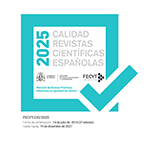Weeding out the Roots? Migrant Identity in A.M. Bakalar’s Polish-British Fiction
Abstract
Poles are one of the largest non-UK born ethnic groups in all countries and most regions of the United Kingdom. Since Poland’s accession to the European Union in May 2004, thousands of Poles have migrated to the UK, hoping for better professional opportunities and higher standards of living. It was thus only a matter of time before Poles started to put their experience of migration on paper. One example is A.M. Bakalar, whose literary debut, Madame Mephisto (2012), was promoted as the voice of the new wave of Polish migration and the first novel to be written in English by a Polish female author since Poland joined the EU in 2004. This article centres on Bakalar’s protagonist, a thirty-year-old Pole in London, with the aim of revealing how cultural myths and beliefs feed into the process of identity formation and what it takes for the experience of migration to go awry. By exploring Magda’s problematic relationship with her home country, represented as oppressive and insular, this article inquiries into the nature of contemporary migrant experience and the role which national identity plays in the process of cultural adjustment.
Downloads
Article download
License
In order to support the global exchange of knowledge, the journal Complutense Journal of English Studies is allowing unrestricted access to its content as from its publication in this electronic edition, and as such it is an open-access journal. The originals published in this journal are the property of the Complutense University of Madrid and any reproduction thereof in full or in part must cite the source. All content is distributed under a Creative Commons Attribution 4.0 use and distribution licence (CC BY 4.0). This circumstance must be expressly stated in these terms where necessary. You can view the summary and the complete legal text of the licence.









